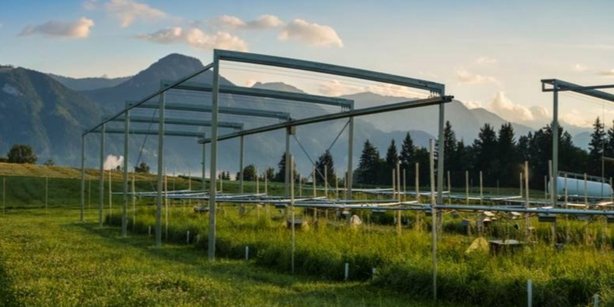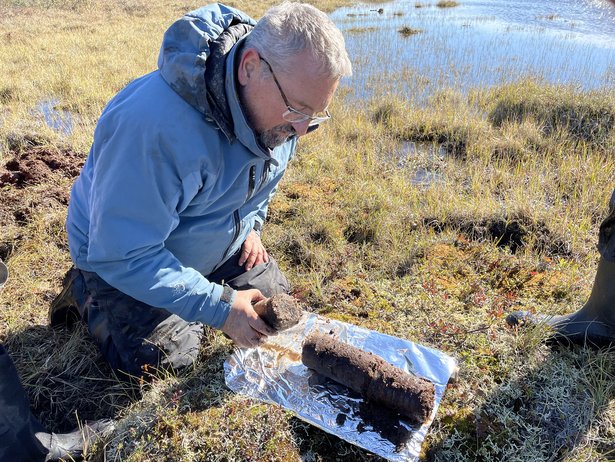ClimGrass C – Grassland carbon dynamics in a changing climate

Climate changes and elevated CO2 have major impacts on biogeochemical cycles, which may in turn feed back on the climate system. ClimGrass-C is a new…
☎ +43 1 4277 91260
✉ andreas.richter(at)univie.ac.at
» CV
» u:cris
» u:find

Soil microorganisms are the hidden engines of all global biogeochemical cycles and are essential to life on Earth. The Soil Ecology Research Group, led by Andreas Richter, focuses on understanding how microbial growth and turnover regulate the decomposition and transformation of organic matter in soils. Ultimately, their goal is to predict how future climate change, including climate extremes, will reshape microbial physiology, cross-kingdom microbial interactions, and microbial communities and their processes, and how this may feed back on climate change.
The Soil Ecology Research Group expands and redefines the theoretical concepts of microbial growth, as well as carbon- and nitrogen-use efficiency, linking these to ecological stoichiometry theory. They also pioneer novel approaches to quantify microbial growth processes using stable oxygen and hydrogen isotopes. The group explores microbial activities and soil organic matter turnover in a wide variety of ecosystems, ranging from Arctic tundra to tropical rainforests across all continents.
• Ecology of Soil Microorganisms and Their Interactions
• Climate-Change Ecology of Microbial Communities
• Microbial Growth, Turnover, and Carbon-Use Efficiency
• Biogeochemical Cycling of Carbon, Nitrogen, and Phosphorus
• Microbial Controls on Soil-Climate Feedbacks


Climate changes and elevated CO2 have major impacts on biogeochemical cycles, which may in turn feed back on the climate system. ClimGrass-C is a new…

The Arctic is warming more rapidly than any other region in the world. There, permafrost soils cover ~25% of terrestrial surface and hold the world's…

The Amazon rainforest stores large amounts of carbon in plant biomass and in soils, and is an important sink for atmospheric CO2 setting off increased…
Canarini, A., Fuchslueger, L., Schnecker, J., Metze, D., Nelson, D., Kahmen, A., Watzka, M., Pötsch, E., Schaumberger, A., Bahn, M., Richter, A. (2024) Soil fungi remain active and invest in storage compounds during drought independent of future climate conditions. Nature Communications 15: 10410.
Metze, D., Schnecker, J., Le Noir de Carlan, C., Bhattarai, B., Verbruggen, E., Ostonen, I., Janssens, I.A., Sigurdsson, B.D., Hausmann, B., Kaiser, C., Richter, A. (2024) Soil warming increases the number of growing bacterial taxa, but not their growth rates. Science Advances 10: eadk6295.
Metze, D., Schnecker, J., Canarini, A., Fuchslueger, L., Koch, B.J., Stone, B.W., Hungate, B.A., Hausmann, B., Schmidt, H., Schaumberger, A., Bahn, M., Kaiser, C., Richter, A. (2023)
Microbial growth under drought is confined to distinct taxa and modified by potential future climate conditions. Nature Communications 14: 5895.
Canarini, A., Schmidt, H., Fuchslueger, L., Martin, V., Herbold, C., Zezula, D., Gündler, P., Hasibeder, R., Jecmenica, M., Bahn, M., Richter, A. (2021) Ecological memory of recurrent drought modifies soil processes via changes in soil microbial community. Nature Communications 12: 5308.
Soong, J.L., Fuchslueger, L., Marañon-Jimenez, S., Torn, M.S., Janssens, I.A., Penuelas, J., Richter, A. (2020) Microbial carbon limitation - the need for integrating microorganisms into our understanding of ecosystem carbon cycling. Global Change Biology 26: 1953-1961.
Krasenbrink, J., Hanson, B. T., Weiss, A. S., Borusak, S., Tanabe, T. S., Lang, M., Aichinger, G., Hausmann, B., Berry, D., Richter, A., Marko, D., Mussmann, M., Schleheck, D., Stecher, B., & Loy, A. (2025). Sulfoquinovose is exclusively metabolized by the gut microbiota and degraded differently in mice and humans. Microbiome, 13(1), Article 184. https://doi.org/10.1186/s40168-025-02175-x
Chen, S.-C., Li, X.-M., Battisti, N., Guan, G., Montoya, M. A., Osvatic, J., Pjevac, P., Pollak, S., Richter, A., Schintlmeister, A., Wanek, W., Mussmann, M., & Loy, A. (2025). Microbial iron oxide respiration coupled to sulfide oxidation. Nature, 646(8086). https://doi.org/10.1038/s41586-025-09467-0
Marañón-Jiménez, S., Luo, X., Richter, A., Gündler, P., Fuchslueger, L., Verbrigghe, N., Poeplau, C., Sigurdsson, B. D., Janssens, I., & Peñuelas, J. (2025). Warming Weakens Soil Nitrogen Stabilization Pathways Driving Proportional Carbon Losses in Subarctic Ecosystems. Global Change Biology, 31(6), Article e70309. https://doi.org/10.1111/gcb.70309
Dahl, M. B., Brachmann, S., Söllinger, A., Schnell, M., Ahlers, L., Wutkowska, M., Hoff, K. J., Nath, N., Groß, V., Wang, H., Weil, M., Piecha, M., Schaffer, M., Jensen, C., Kuss, A. W., Gall, C., Wimmer, E., Pribasnig, T., Tveit, A. T., ... Urich, T. (2025). Quantifying Soil Microbiome Abundance by Metatranscriptomics and Complementary Molecular Techniques-Cross-Validation and Perspectives. Molecular Ecology Resources, e14130. Advance online publication. https://doi.org/10.1111/1755-0998.14130
Schärer, M. L., Fuchslueger, L., Canarini, A., Richter, A., Lüscher, A., & Kahmen, A. (2025). Post-drought organic carbon mineralization leads to high productivity and nutrient uptake efficiency of perennial grassland after rewetting. Soil Biology and Biochemistry, 204, Article 109744. https://doi.org/10.1016/j.soilbio.2025.109744
Andreas Richter is part of the FWF-funded Cluster of Excellence (CoE)

